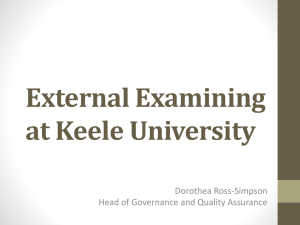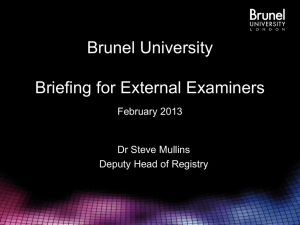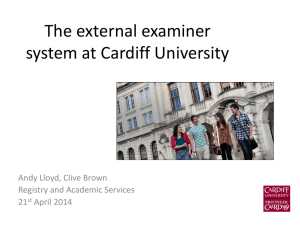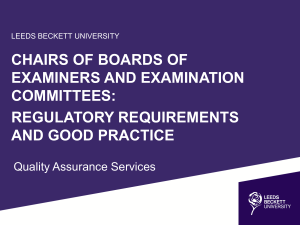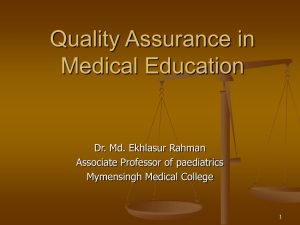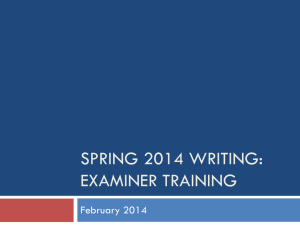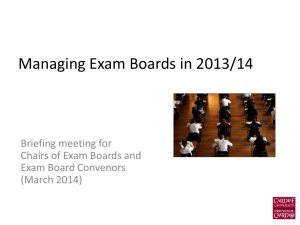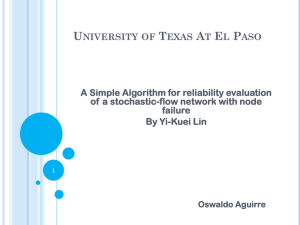Edinburgh Napier University External Examiner Induction & Training
advertisement
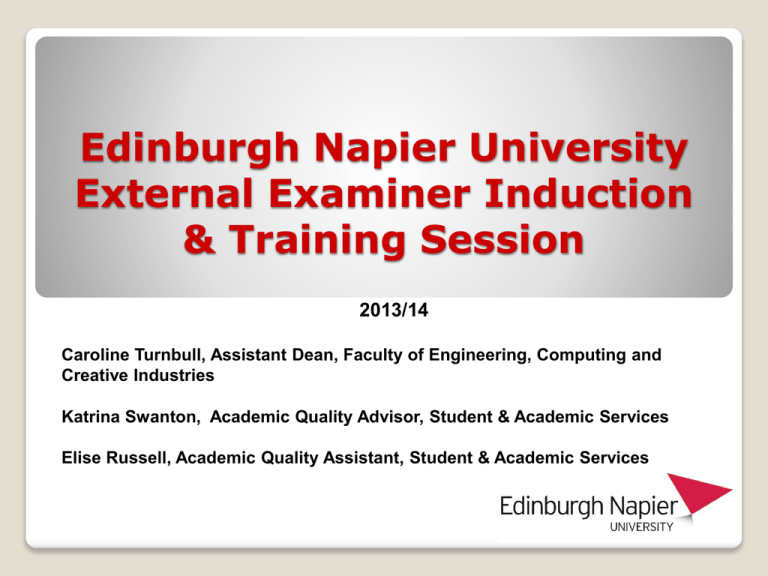
Edinburgh Napier University External Examiner Induction & Training Session 2013/14 Caroline Turnbull, Assistant Dean, Faculty of Engineering, Computing and Creative Industries Katrina Swanton, Academic Quality Advisor, Student & Academic Services Elise Russell, Academic Quality Assistant, Student & Academic Services Brief History of the External Examiner System • First introduced in the 19th Century at Durham University who reached an agreement with University of Oxford for it to supply examiners – to increase the pool of expertise and to demonstrate comparability of awards • During the 19th and 20th centuries newly created Universities in Britain and Ireland similarly adopted an external examiner system • External examining (except at Doctoral level) remains largely confined to the UK and Ireland Source: A Handbook for External Examining (2012) Higher Education Academy Brief History of the External Examiner System • In 1997 the external examining system was reviewed by the Dearing Committee which recommended: • “The remit of the external examiner will need to be consistent across the UK […] Examiners will need to be fully aware of the aims, teaching methods and approach of programmes under examination” • In the same year, the Quality Assurance Agency for Higher Education (QAA) was established and in 2000, the QAA Code of Practice was published incorporating Section 4 which included sector expectations around external examining. Source: A Handbook for External Examining (2012) Higher Education Academy Brief History of the External Examiner System • In 2008/09 academic standards were reviewed by the QAA and by the House of Commons Innovation, Universities, Science and Skills Committee. • Both reviews confirmed the importance of the external examining system in assuring academic standards. • In 2011, the QAA published Chapter B7 on external examining within its new Quality Code for Higher Education Source: A Handbook for External Examining (2012) Higher Education Academy Brief History of the External Examiner System In the UK’s system of higher education, institutions are responsible for the quality of the education they provide [...and] for the academic standards of awards they offer. External examining provides one of the principal means for maintaining UK threshold academic standards within autonomous higher education institutions. External examining is therefore an integral and essential part of institutional quality assurance. Source: Chapter B7: External Examining – UK Quality Code, QAA (2011) Threshold Academic Standards Threshold academic standards are the level of achievement that a student has to reach to gain an academic award. For equivalent awards, the threshold level of achievement should be the same across the UK. External examiners are appointed to provide each institution with impartial and independent advice, as well as informative comment on the institution’s standards and on student achievement in relation to those standards. Chapter B7: External Examining – UK Quality Code, QAA (2011) Threshold Academic Standards Indicator 2 Awarding institutions expect their external examiners to provide informative comment and recommendations upon whether or not: • An Institution is maintaining the threshold academic standards set for its awards in accordance with the frameworks for higher education qualifications (FHEQ) and applicable subject benchmark statements Chapter B7: External Examining – UK Quality Code, QAA (2011) Threshold Academic Standards Indicator 2 Awarding institutions expect their external examiners to provide informative comment and recommendations upon whether or not: • The assessment process measures student achievement rigorously and fairly against the intended outcomes of the programme(s) and is conducted in line with the institution’s policies and regulations Chapter B7: External Examining – UK Quality Code, QAA (2011) Threshold Academic Standards Indicator 2 Awarding institutions expect their external examiners to provide informative comment and recommendations upon whether or not: • The academic standards and achievements of students are comparable with those in other UK higher education institutions of which the external examiners have experience Chapter B7: External Examining – UK Quality Code, QAA (2011) Quality Enhancement Indicator 3 Awarding institutions expect their external examiners to provide informative comment and recommendations on: • Good practice and innovation relating to learning, teaching and assessment observed by external examiners • Opportunities to enhance the quality of the student learning experience Chapter B7: External Examining – UK Quality Code, QAA (2011) Annual Report Indicator 13 External examiners’ annual reports provide clear and informative feedback to the Institution on those areas defined for the role in Indicators 2 and 3. Chapter B7: External Examining – UK Quality Code, QAA (2011) So, how do we do things at Edinburgh Napier University? Our Assessment Handbook http://staff.napier.ac.uk/services/academicdevelopment/LTA/Lists/ Resources/Attachments/40/AssessmentHandbook_Oct2012.pdf Programme Design Guidelines http://staff.napier.ac.uk/services/academicdevelopment/LTA/Lists/ Resources/Attachments/41/20-Credit%20Handbook.pdf Our Academic Regulations http://staff.napier.ac.uk/services/sas/Regulations University Academic Regulations All members of examination boards are expected to be familiar with the contents of Sections A-C of the University Regulations. You are not expected to know all of the Regulations off the top of your head! University Academic Regulations A copy of the Regulations should always be made available during meetings of Board, along with any approved exemptions that apply to programmes under consideration University Academic Regulations Regulations A3, B2 and C2 include definitions of the terms commonly used within our Boards at Edinburgh Napier University Academic Regulations There are some key Regulations that you should be particularly aware of… University Academic Regulations To pass a module at the first attempt, students must achieve a minimum mark of 40% (SCQF 7-10) or P1 (SCQF 11) If two components of assessment are used, a student must achieve at least 40%/P1 on the weighted marks achieved for each component, with no individual mark for a component falling below 30%/F1. There is no minimum mark requirement for individual elements making up a component. (Reg B5.3/C5.2) NB. Modules within the pre-registration Nursing & Midwifery programmes must be passed with at least 40% in ALL components (Reg B8.5.6) University Academic Regulations Our undergraduate provision is assessed using a percentage mark system (0-100%) Our postgraduate provision is assessed on the basis of a 16point grading scale incorporating three standards: Distinction, Pass and Fail. Overall Grade Distinction Scale Grade D5 D4 D3 D2 D1 Pass P5 P4 P3 P2 P1 Fail F1 F2 F3 F4 F5 F6 University Academic Regulations To pass a module at the first attempt, students must achieve a minimum mark of 40% (SCQF 7-10) or P1 (SCQF 11) If two components of assessment are used, a student must achieve at least 40%/P1 on the weighted marks achieved for each component, with no individual mark for a component falling below 30%/F1. There is no minimum mark requirement for individual elements making up a component. (Reg B5.3/C5.2) NB. Modules within the pre-registration Nursing & Midwifery programmes must be passed with at least 40% in ALL components (Reg B8.5.6) University Academic Regulations Students are entitled to one reassessment opportunity per module. The overall mark for a reassessed module is capped at 40%/P1 In exceptional cases a Programme Board has the discretion to permit one further attempt (Regs B5.5-5.10 – C5.5-C5.12) University Academic Regulations A compulsory opportunity for reassessment is provided in the July following delivery of the module University Academic Regulations Exceptionally students may be permitted to progress to the next stage of study carrying a failure in no more than 20 credits (Reg B6.2) University Academic Regulations Practical Session 1: In pairs or small groups, take a look at scenarios 1 and 2 in your packs. University Academic Regulations Programme Boards may award a compensatory pass where the student has: i) ii) iii) achieved a minimum of 35%*/F1 in a module submitted in each component of assessment in that module and passed all other modules in that stage of study *In exceptional circumstances which MUST be noted in the minutes, the Board has the discretion to award a discretionary pass to a student who achieves a minimum of 30% in the module (Reg B6.3/C6.3) University Academic Regulations Programme Boards must not permit a student to progress to the next stage of study carrying a fail in any programme specific compulsory or option module from a preceding stage of study. (Reg B6.4) University Academic Regulations A student not permitted to progress to the next stage of study may be permitted to continue their studies at the same level either in the same programme on an alternative programme of study provided that the students meets the admission requirements (Reg B6.5) University Academic Regulations Regulations B3 and C3 define the criteria which must be satisfied to receive an award of the University University Academic Regulations For example Regulation B3.9 states: A bachelor’s degree will be awarded to a student who has satisfied all programme specific requirements and gained a minimum of 360 credits of which: a) b) a minimum of 60 credits are at SCQF level 9 or above and; a minimum of 100 credits are at SCQF level 8 or above University Academic Regulations The Regulations determine the criteria for the classification of a bachelors degree with honours: 70% or above – First Class 60-69.5% - Second Class, Upper division (2:1) 50-59.5% - Second Class, Lower division (2:2) 40-49.5% - Third Class (Regulations B3.17-B.3.18) University Academic Regulations The Regulations also detail how students on the cusp (i.e. close to achieving the grades for a higher classification) should be considered by the Board: First Class - 68-69.4% Second Class, Upper division - 58-59.4% Second Class, Lower division - 48-49.4% Third Class – 38-39.4% The Board may use its judgment and discretion based on the student’s overall performance across the best 100 credits at SCQF Level 10. (Regulations B3.17- B3.19) University Academic Regulations Practical Session 2: Please try out scenarios 3-5 in your pairs/groups. Two Tier Board System At Edinburgh Napier University, we operate a two tier system for Boards of Examiners: 1) Module Boards 2) Programme Boards Some external examiners will only be responsible for maintaining oversight of module provision. Some external examiners will maintain oversight of both modules and programmes. Two Tier Board System Module and Programme Boards are held at the end of each of our three trimesters and are about a week apart. Faculties use the Student & Academic Services Key Dates Calendar to identify appropriate timing of Boards and we ask Faculties to inform external examiners of Board dates as soon as possible. Two Tier Board System In general: • the Tri 2 board (May/June) consider marks and progression of Occurrence A students • The Resit board (August) is to consider resit results (for Occurrence A and B students) • The Tri 3 board considers placement activity and results for students studying in Trimester 3 • The Tri 1 (January) board considers marks and progression of Occurrence B students Module Boards Who attends? Module leaders a Convenor* a Clerk External Examiner(s) *The Convenor will normally be the Head of School (or nominated senior member of staff) who has undertaken the mandatory training course. Membership should be approved annually by FASEC A member of staff may not serve as Convenor when it is considering a module in whose assessment he or she has been involved. Module Board Responsibilities Taken from Regulation A10.1.8 To agree the performance for each student on each module being considered Module Board Responsibilities Taken from Regulation A10.1.8 To satisfy itself that all results being presented are correct (it should receive confirmation that pre-board processes have been successfully completed) Module Board Responsibilities Taken from Regulation A10.1.8 To submit verified and confirmed results for modules together with recommendations for pass or fail to Programme Board of Examiners Module Board Responsibilities Taken from Regulation A10.1.8 To approve (where necessary) reassessment tasks or elements to be used, or exceptionally recommending that the entire module be repeated Module Board Responsibilities Taken from Regulation A10.1.8 If necessary, to scale the results of any component of assessment of a module Please note, The Code of Practice on the Scaling of Marks can be found in Appendix F of the University Assessment Handbook Module Board Responsibilities Taken from Regulation A10.1.8 To reflect on and evaluate the effectiveness of the learning, teaching and assessment approaches within the module Module Board Responsibilities Taken from Regulation A10.1.8 Please note: Module Boards do NOT consider the overall performance of individual students or extenuating circumstances University Academic Regulations Practical Session 3: Module Board Scenario Extenuating Circumstances Regulation A10.3 Faculty Extenuating Circumstances Boards are convened at least twice a trimester, usually between module and programme boards to consider whether claims submitted by students are valid. Extenuating Circumstances Regulation A10.3 Where a student’s claim is deemed to be valid, this should be recorded within the student record system Occasionally, due to time-constraints it might not be possible for the student record to be amended prior to the Board - The Clerk and/or Convenor must ensure that the Board is informed where valid extenuating circumstances apply Programme Board Responsibilities Taken from Regulation A10.2.8 Who attends? Programme leaders a Convenor* a Clerk External Examiner(s) Adequate representation of additional colleagues associated with the programme(s) *The Convenor will normally be the Head of School (or nominated senior member of staff) who has undertaken the mandatory training course. Membership should be approved annually by FASEC A member of staff may not serve as Convenor when it is considering a programme in whose assessment he or she has been involved. Programme Board Responsibilities Taken from Regulation A10.2.8 To consider the profile of each student studying on the programme taking account of the confirmed results and recommendations made by Module Board of Examiners Programme Board Responsibilities Taken from Regulation A10.2.8 Where a student is unable to take an assessment, or fails due to approved extenuating circumstances, permitting the student to take the affected assessment at the next opportunity as a first attempt Programme Board Responsibilities Taken from Regulation A10.2.8 To decide if a student will: progress to the next stage of study or transfer to the next stage of study in another programme Programme Board Responsibilities Taken from Regulation A10.2.8 To decide if a student will: continue at the same stage of study on their current programme, or transfer to the same stage of study in another programme Programme Board Responsibilities Taken from Regulation A10.2.8 To decide if a student will: leave the programme at an exit point with a relevant award Programme Board Responsibilities Taken from Regulation A10.2.8 To decide on the award and any classification (taking into account any approved extenuating circumstances, Regulation A4 and appropriate award & classification Regulations in Sections B & C of the University Regulations) Programme Board Responsibilities Taken from Regulation A10.2.8 To consider whether poor performance in a module can be compensated Programme Board Responsibilities Taken from Regulation A10.2.8 Be aware that a decision of the Programme Board can be deferred until further sufficient information is available. Programme Board Responsibilities Taken from Regulation A10.2.8 To reflect on and evaluate the effectiveness of the overall teaching, learning and assessment approaches adopted by the programmes associated with the students being considered University Academic Regulations Practical Session 4 Final Programme Board Scenario The Role of The External Examiner The role and responsibilities of external examiners is defined in Regulation A9 External examiners advise the Board of Examiners, but decisions on student performance and awards are those of are those of the Board as a whole, ie. the external examiner does not get a casting vote. The Role of The External Examiner Regulation A9.4 As a minimum, external examiners are asked to review a square root sample of completed assessment assignments and comment on: • Whether the academic standard of each module or programme study being considered is set and maintained at the appropriate level The Role of The External Examiner Regulation A9.4 As a minimum, external examiners are asked to review a square root sample of completed assessment assignments and comment on: • Whether the standards of student performance are properly judged against the level set The Role of The External Examiner Regulation A9.4 As a minimum, external examiners are asked to review a square root sample of completed assessment assignments and comment on: • Whether the assessment process is appropriate, rigorous, equitable and conducted in accordance with University guidance The Role of The External Examiner Regulation A9.4 As a minimum, external examiners are asked to review a square root sample of completed assessment assignments and comment on: • The comparability of the standard and level of student achievement with those in other higher education institutions External Examiner’s Annual Report External examiners are asked to report annually to the University on issues relating to the ‘Academic Good Health’ of our provision (set out in Regulation A9.4) and good practice identified. On receipt of the annual report, it is distributed to appropriate staff to identify any issues raised that require investigation and consideration. A response should be sent to the external examiner. External Examiner’s Annual Report External Examiner Payment & Expenses Contact Us Academic Quality has a dedicated email account for all external examiner enquiries: externalexaminers@napier.ac.uk Our website url: http://staff.napier.ac.uk/services/sas/academic_quality/External_Examiners/
